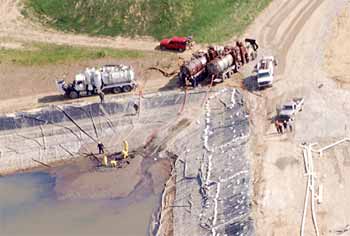Pennsylvania's natural gas drillers are still flushing vast quantities of contaminated wastewater into rivers that supply drinking water, despite major progress by the industry over the past year in curtailing the practice.
Photo: marcellus-shale.us
Under pressure from environmentalists and state officials, energy companies that have been drilling thousands of gas wells in the state's countryside spent part of 2010 overhauling the way they handle the chemically tainted and sometimes radioactive water that gushes from the ground after a drilling technique known as high-volume hydraulic fracturing, or fracking.
Until the second half of last year, Pennsylvania had been the only state to allow most of this wastewater to be discharged into rivers after only partial treatment. Other states required most or all of the brine to be disposed of by injecting it deep underground.
In recent months, though, the industry has boasted big gains in the amount of well wastewater that is reused, rather than trucked to treatment plants that empty into rivers and streams.
See: Articles on Fracking waste water.
See: Pittsburgh’s drinking water is radioactive, thanks to fracking. Only question is, how much?






